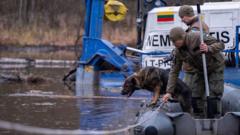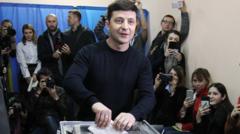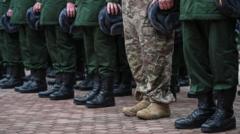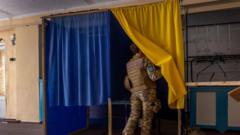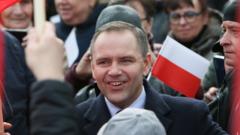The recent vote to boost military investment in Germany signals a significant shift from historical pacifism towards proactive defense strategies amid escalating tensions, particularly with Russia.
Germany Shifts Military Stance: A New Era of Defense and Preparedness
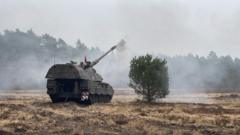
Germany Shifts Military Stance: A New Era of Defense and Preparedness
Germany's commitment to military modernization and defense spending grows as it responds to rising global threats.
The article text:
Germany has taken a notable step towards a more aggressive military stance, having recently voted to significantly increase investment in its defense sector. This decision allows the Bundeswehr, the German military, to boost its funding amid strict debt rules, a move experts attribute to growing concerns over Russian aggression.
During military training exercises in Munster, residents are becoming accustomed to the sounds of missiles being launched, yet this is only a sign of the impending increase in military activity. General Carsten Breuer, the country’s top military official, recently expressed the urgent need for this financial infusion, especially as he perceives a looming threat from Russia. He warned that NATO should be prepared for potential escalations from Putin within a few years.
This pivot in policy marks a stark contrast to Germany’s post-World War II stance, which has traditionally emphasized military restraint and opposition to militarism. According to Markus Ziener of the German Marshall Fund, this ingrained ethos has complicated public acceptance of a military buildup. As the full scope of Russia's invasion of Ukraine became clear, Chancellor Olaf Scholz declared a "Zeitenwende", or a turning point, vowing to invest €100 billion ($108 billion) into the military.
Despite this hefty injection of funds, General Breuer believes it has not addressed the forces' dire requirements, indicating that they face significant shortages across the board. A recent parliamentary report corroborated this, revealing insufficient ammunition, soldiers, and equipment, in addition to the state of military facilities, which are in dire need of renovation.
As history shows, Germany has maintained a cautious approach toward military engagements, fostering a business relationship with Russia under former Chancellor Angela Merkel. However, this changed after the invasion of Ukraine, prompting a reevaluation of Germany’s defense strategy and priorities. More citizens now perceive military preparedness as a necessity to counter the growing threat from Putin, as recent polling showed a substantial proportion of Germans viewing both Putin and former U.S. President Donald Trump as significant risks to European security.
This newfound urgency is also reflected in the views of younger Germans, as showcased by members of the public like eighteen-year-old Charlotte Kreft, who has shifted from pacifist beliefs to recognizing the need for military readiness. Yet, there still exists a divide among citizens regarding increased military expenditure and enlistment, revealing an internal struggle as the country grapples with the legacy of its past.
General Breuer emphasizes the need for exponential growth in troop numbers, aiming for a total of 460,000 personnel, which necessitates a return to some form of conscription. His outreach efforts involve engaging citizens in conversations about military readiness, raising awareness of threats and calling for preparedness.
As the public conversation surrounding defense spending evolves, Germany finds itself reassessing its historical stance on military matters, potentially redefining its role on the global security stage amid rising geopolitical tensions. The acknowledgment of this urgent reality symbolizes a significant change in the narrative surrounding Germany's military identity.
Germany has taken a notable step towards a more aggressive military stance, having recently voted to significantly increase investment in its defense sector. This decision allows the Bundeswehr, the German military, to boost its funding amid strict debt rules, a move experts attribute to growing concerns over Russian aggression.
During military training exercises in Munster, residents are becoming accustomed to the sounds of missiles being launched, yet this is only a sign of the impending increase in military activity. General Carsten Breuer, the country’s top military official, recently expressed the urgent need for this financial infusion, especially as he perceives a looming threat from Russia. He warned that NATO should be prepared for potential escalations from Putin within a few years.
This pivot in policy marks a stark contrast to Germany’s post-World War II stance, which has traditionally emphasized military restraint and opposition to militarism. According to Markus Ziener of the German Marshall Fund, this ingrained ethos has complicated public acceptance of a military buildup. As the full scope of Russia's invasion of Ukraine became clear, Chancellor Olaf Scholz declared a "Zeitenwende", or a turning point, vowing to invest €100 billion ($108 billion) into the military.
Despite this hefty injection of funds, General Breuer believes it has not addressed the forces' dire requirements, indicating that they face significant shortages across the board. A recent parliamentary report corroborated this, revealing insufficient ammunition, soldiers, and equipment, in addition to the state of military facilities, which are in dire need of renovation.
As history shows, Germany has maintained a cautious approach toward military engagements, fostering a business relationship with Russia under former Chancellor Angela Merkel. However, this changed after the invasion of Ukraine, prompting a reevaluation of Germany’s defense strategy and priorities. More citizens now perceive military preparedness as a necessity to counter the growing threat from Putin, as recent polling showed a substantial proportion of Germans viewing both Putin and former U.S. President Donald Trump as significant risks to European security.
This newfound urgency is also reflected in the views of younger Germans, as showcased by members of the public like eighteen-year-old Charlotte Kreft, who has shifted from pacifist beliefs to recognizing the need for military readiness. Yet, there still exists a divide among citizens regarding increased military expenditure and enlistment, revealing an internal struggle as the country grapples with the legacy of its past.
General Breuer emphasizes the need for exponential growth in troop numbers, aiming for a total of 460,000 personnel, which necessitates a return to some form of conscription. His outreach efforts involve engaging citizens in conversations about military readiness, raising awareness of threats and calling for preparedness.
As the public conversation surrounding defense spending evolves, Germany finds itself reassessing its historical stance on military matters, potentially redefining its role on the global security stage amid rising geopolitical tensions. The acknowledgment of this urgent reality symbolizes a significant change in the narrative surrounding Germany's military identity.

